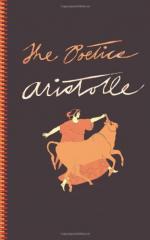
|
| Name: _________________________ | Period: ___________________ |
This test consists of 5 multiple choice questions, 5 short answer questions, and 10 short essay questions.
Multiple Choice Questions
1. What is one of the requirements Aristotle mentions for a good tragic plot?
(a) A good plot must be unified.
(b) A good plot must have disconnected episodes that tie together at the end.
(c) A good plot must be mysterious.
(d) A good plot must be tragic in the beginning, middle, and end.
2. A character attempting to save his friend but accidentally killing him instead is an example Aristotle gives for what?
(a) Reversal of Situation.
(b) Recognition.
(c) Second degree manslaughter.
(d) Bad luck.
3. When the poet takes the appropriate steps in developing plot, Aristotle explains that the poet is much more likely to do what?
(a) Choose great characters.
(b) Have more consistencies in the plot.
(c) Have a strong ending.
(d) Have a strong beginning.
4. What type of poetry does Aristotle say focuses on serious and important actions?
(a) Roman poetry.
(b) Greek poetry.
(c) Tragedy.
(d) None of the answers is correct.
5. The plot, as Aristotle explains, should be unified in such a way that each part should be what?
(a) Trivial.
(b) Necessary to the whole.
(c) Equivalent.
(d) Necessary to other parts, but not to the whole.
Short Answer Questions
1. In a tragedy, how does Aristotle say the element of surprise should come about?
2. What, as Aristotle states, are good poets forced to do when they write stories with episodic plots?
3. Per Aristotle, in which of the following ways does poetry NOT differ from history?
4. Aristotle states that poetry depicts what?
5. Aristotle explains that actions described in a tragic plot should have certain characteristics. Which one of the following is NOT one of the characteristics that Aristotle identifies?
Short Essay Questions
1. Why does Aristotle consider poetic work to be a philosophical undertaking, and, therefore, a higher pursuit than history, which is concerned simply with facts?
2. How does Aristotle say that poetry differs from history?
3. Aristotle explains that the object which poetry portrays is men in action. How may poets differ in how they represent these men?
4. Whom does Aristotle say favors episodic, as opposed to epic, storytelling and why?
5. Based on Aristotle's teachings, what does it mean when a plot is unified?
6. According to Aristotle, different types of poetry emerge from the personalities of different types of men. What are two examples Aristotle gives in relationship to personality of men and types of poetry?
7. Is the unity of plot the same as the unity of a character's actions? Explain.
8. According to Aristotle, how does the method of imitation differ?
9. Based on Section I of Aristotle's "Poetics", how is the medium specific to poetry similar to and different from prose?
10. According to Aristotle, what is an example of a poor type of story and why?
|
This section contains 1,034 words (approx. 4 pages at 300 words per page) |

|




